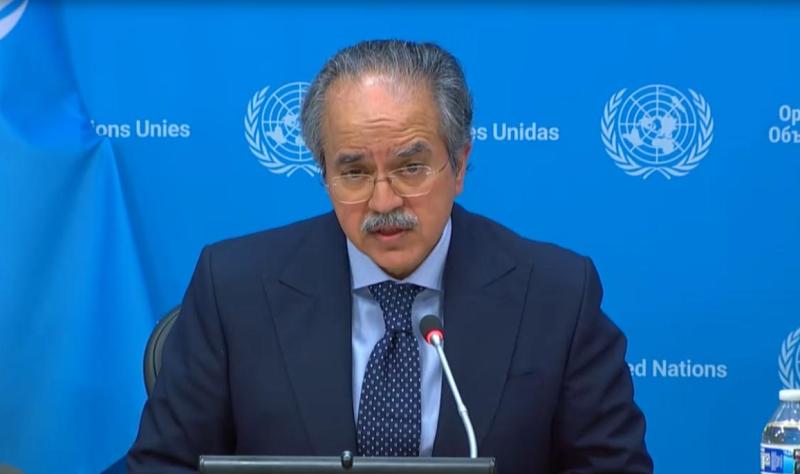UNITED NATIONS: Amid escalating tensions in South Asia, Ambassador Asim Iftikhar Ahmed, Pakistan’s Permanent Representative to the UN, addressed a press conference highlighting Pakistan’s grave concerns over India’s recent actions.
On April 23, India made what Pakistan calls “unjustified and unilateral” moves, accompanied by aggressive public statements. These developments have severely heightened regional tensions, posing a real threat of military escalation.
“We believe it is critical to update the world and share Pakistan’s perspective,” said Ambassador Ahmed.
Pakistan Warns of Imminent Threat, Calls for UN Intervention
Pakistan has credible intelligence suggesting the possibility of imminent kinetic action by India. In response, Pakistan has briefed the UN Secretary-General, the Presidents of the General Assembly and Security Council, the OIC group, and several key international partners.
Ambassador Ahmed condemned India’s “irresponsible and destabilizing” behavior following the April 22 Pahalgam attack in Indian-occupied Jammu and Kashmir. “India’s actions reflect a dangerous disregard for international law,” he stated.
Pakistan has clarified that it does not seek escalation. However, it stands fully prepared to defend its sovereignty and territorial integrity. “Pakistan will exercise its legitimate right to self-defense, as enshrined in the UN Charter,” Ahmed asserted.
Rejecting Allegations, Demanding Evidence
Pakistan strongly rejected any attempt to link it to the April 22 terrorist attack in Pahalgam. Ambassador Ahmed criticized India for leveling “baseless allegations” without conducting a credible investigation or sharing evidence.
He emphasized Pakistan’s firm stance against terrorism in all forms. “Nothing justifies the targeting of innocent civilians,” he said. Pakistan has expressed condolences for the victims and engaged constructively with UN Security Council members to issue a joint condemnation of the attack.
Grave Concerns Over Indus Waters Treaty Violation
A key point of concern was India’s decision to suspend the Indus Waters Treaty—a landmark, legally binding agreement brokered by the World Bank in 1960. The treaty guarantees Pakistan’s rights to the three Western rivers, which support over 240 million people.
“This move is illegal and unilateral,” said Ahmed. He warned that any attempt to divert Pakistan’s rightful water resources would be considered an act of war. “Such a step threatens our existence and sets a dangerous precedent for lower riparian states worldwide.”
Kashmir Dispute: Root Cause of Instability
The ambassador reiterated that the unresolved Jammu and Kashmir dispute remains the root cause of regional instability. “Durable peace will remain elusive without a just settlement in line with UN Security Council resolutions and the will of the Kashmiri people,” he emphasized.
He expressed deep concern over ongoing human rights violations in Indian-occupied Kashmir, including arbitrary arrests, home demolitions, and collective punishment.
Pakistan Seeks Peaceful Coexistence
“Pakistan seeks peaceful and cooperative relations with all neighbors, including India,” Ahmed stated. He stressed that this vision must be mutual and based on equality, mutual respect, and peaceful dispute resolution.
He called the unfolding situation “a serious threat to international peace and security,” urging immediate de-escalation. “Escalatory rhetoric and unilateral actions are counterproductive,” he warned.
International Community Must Act
Ambassador Ahmed appreciated the UN Secretary-General and others for their efforts in promoting dialogue. He called for intensified diplomatic outreach to prevent conflict in South Asia, a region home to nearly two billion people. “It is time for sanity to prevail,” he concluded.
Pakistan Considers Security Council Meeting
When asked whether Pakistan would request a formal UN Security Council meeting, Ambassador Ahmed said it was a legitimate option. “We’ve consulted with Council members, and we reserve the right to request a meeting when deemed appropriate,” he confirmed.
He also reiterated Pakistan’s demand for a neutral, independent investigation into the Pahalgam incident. “India cannot act as judge and jury while failing to provide credible proof,” he said.
U.S. Role Vital in Diffusing Tensions
Responding to questions about the U.S. role, Ambassador Ahmed stressed its importance as a Security Council permanent member with strong ties to both Pakistan and India. “We expect major powers, especially the P5, to step up efforts to resolve the Kashmir dispute,” he said.
He called on the Security Council not to allow the issue to fester further, urging immediate and sustained diplomatic efforts.
Drawing Parallels with Palestine
Ahmed also drew parallels between the Kashmir and Palestinian issues. “Both involve illegal occupations and the suppression of the right to self-determination,” he noted. “These rights were guaranteed by the UN but remain unfulfilled.”


Comments are closed.